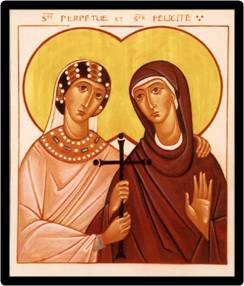MARCH 7 - ST. PERPETUA AND ST. FELICITY

Perpetua and Felicity lived in Carthage, North Africa. It was the time of the terrible torture of Christians by Emperor Septimus Severus at the beginning of the third century.
Twenty-two-year-old Perpetua was the daughter of a rich pagan (did not believe in God) nobleman. While growing up, she had been given everything she had ever wanted. But then she converted and became a Christian. She realized that she loved Jesus and her Christian faith more than anything the world could offer. For this she found herself a prisoner on the way to execution (to be killed).
Perpetua’s father did everything possible to persuade his daughter to give up her Christian faith. He tried to convince her of the importance of saving her life. But she would not give in, even though she knew that she would have to leave behind her husband and baby.
Felicity, Perpetua’s maid, who had earlier been a slave, also became a Christian. She and Perpetua were great friends. They shared their belief in and love for Jesus. Felicity, too, was willing to sacrifice her life for Jesus and for her faith. For this she also found herself a prisoner on the way to execution.
Felicity was also a young wife and while she was in prison she gave birth to a child. Her little baby was adopted by a good Christian woman. Felicity was happy because now she could die a martyr (to die for Jesus and her faith).
Hand in hand, Perpetua and Felicity bravely faced martyrdom together. They marched from their cells into the amphitheater, as if into heaven, with cheerful looks and graceful bearing. If they trembled it was for joy and not for fear.
The people, demanded that the martyrs be led to the middle of the amphitheater where they could see them die. Without being asked they went where the people wanted them to go; but first they kissed one another, to complete their witness with the customary kiss of peace. Then they were charged and attacked by wild animals and later beheaded.
Bravest and happiest martyrs! They died in the year 203.
